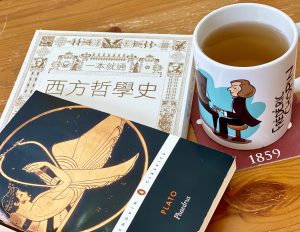ø
English phrases that have interesting if not conflicted meaning:
original copy
civil war
unbiased opinion
fight for peace
clearly misunderstood
found missing
happily married
humane slaughter
good grief
ø
English phrases that have interesting if not conflicted meaning:
original copy
civil war
unbiased opinion
fight for peace
clearly misunderstood
found missing
happily married
humane slaughter
good grief
ø
作家愛默生說:「每個人獨自一人的時候都是真誠的,直到第二個人進入房間,才開始了虛偽。」這話咋一聽起來似乎有點絕對了,但細心體悟也許頗有些道理。记得著名的哈佛心理学家斯金纳教授做了很多实验,证实了人的行为可以被修正,来自条件反射以及各种人生精神上以及行为上的经历。他的实验尽管有很多的事实依据,但受到了心理学其它门派的批判,特别是来自人道主义心理学派的猛烈抨击。他们普遍认为行为心理学片面和机械地把人约定为有限的可以检测的模式里,无法衡量人精神层面的东西。
总之,谁会是那个进入你房间的第二个人呢?
ø
Abandoning Deng Xiaoping’s longtime policy of “concealing the strength” in international diplomacy, today’s Chinese diplomats are assertive and confrontational. They embrace a new brand of “Wolf-Worrior diplomacy” on overseas social media platforms, which is adopted from the popular Rambo-styled Chinese action movie “Wolf Warrior II.” In China, this style of diplomacy echoes the souring nationalism.
But how are they received in the international community?
ø

This sunny morning, I am enjoying the freshly brewed Taiwan high mountain tea in my favorite Chopin coffee mug acquired from Chopin Museum in Warsaw, Poland, whilst listening to Horowitz playing Chopin’s Ballade in G minor. This is truly a heart-warming, perhaps even a little serene moment, especially given the quiet, sub-zero frozen weather outside. Before me on the desk are two books that I acquired at the once trendy Eslite Bookstore a few years ago in Taipei. The Eslite Bookstore had huge selections: books, magazines, and even fine coffee/tea along the side, with hundreds of readers visiting there daily. Sadly, it closed in 2020 due to financial difficulty like many other fine bookstores around the world. The bookstore might be gone, the fond memory remains, much in the same manner with other good things in life. I pity over the fact that many book readers are these days becoming readers of electronic devices — such transition may save a few trees if one wishes to spin it hard to be positive, but humans do lose much more, such as the smell of new and old pages, as well as a fancy bookmark, perhaps. It is simply a different experience. Cicero once said, “A room without books is like a body without a soul.” And I honor him utterly by having a folding magazine self in my bathroom–we are in full agreement, after all. I have, yet, another grave concern this morning over the white-cover book “A History of Western Philosophy” as shown in the picture above. Readers could be easily misled by its coverage of the ancient Greek classics should they not have the experience of reading those books themselves. The author is a well-respected Taiwanese scholar, Yale-trained, who has probably done a terrific job in discussing contemporary and modern philosophy due to marked influence from scholars of the Frankfurt School. His views on the Greek classics, however, fall miles short given his sophist perspective that is both atheist and agnostic. A good student of the Greek classics ought to be spiritually, if not divinely, on the journey of seeking wisdom, meaning, and insight of higher dimensions, so as to appreciate in depth the works of Plato and others. Here I don’t question the good intention of this Taiwanese scholar, but was a tad disappointed given his Chinese background with the potential to search deeper for “Priori” or in Taoist term for returning to “original truth.” Modern education is producing a new breed of sophistry with the decline of intellectual curiosity. In “The Origins of Totalitarianism,” Hannah Arendt wrote, “The most striking difference between ancient and modern sophists is that the ancients were satisfied with a passing victory of the argument at the expense of truth, whereas the moderns want a more lasting victory at the expense of reality.” There are, apparently, a handful of clever thinkers, perhaps such as Sir Roger Scruton (1944-2020). Though we may not agree with souls like him on every matter, they make us think, if not think harder, especially when society’s “invisible hand” tends to be cultural Marxism these days. In “The Art of Rhetoric,” Plato’s student Aristotle alerted us, “What makes a man a ‘sophist’ is not his faculty, but his moral purpose.”
ø
Some years ago I had the opportunity to attend the prestigious Bayreuth Festival, an annual performance season for operas by the 19th-century German composer Richard Wagner. As reported by the NY Times, the tickets are extremely difficult to obtain, but I was lucky (through a German friend) to get tickets to two operas. Before my trip, my adopted German family sent me this book “Wagner Operas,” not at all an easy read to be frank. Yet I gave it a try with the help of a strong coffee in a camera-lens cup.

ø
On Feb 17, 2011, I was at the Grande Albergo le Fonti, Chianciano, Italy, attending a conference organized by the Hands Off Cain, a human rights organization based in Rome, Italy. I love the traditional furnace in the hotel lobby, hence this picture from a mobile device. This is a lovely region with terrific food, though infrequently visited by foreign tourists. #FondMemory
